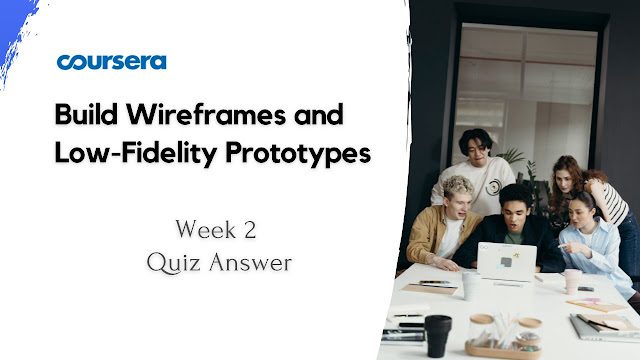Build Wireframes and Low-Fidelity Prototypes Week 2 Quiz Answer
Hello Friends in this article i am gone to share Build Wireframes and Low-Fidelity Prototypes Week 2 Quiz Answer with you..
Build Wireframes and Low-Fidelity Prototypes Week 2 Quiz Answer
Also visit this link: Build Wireframes and Low-Fidelity Prototypes Week 1 Quiz Answer
Test your knowledge on information architecture
Question 1)
What does information architecture (IA) do?
- Inspires architecture-related UX designs
- Creates a basic outline of a digital experience, like an app or website
- Visually describes and explores a user’s experience with a product
- Organizes content to help users understand where they are in a product, and where the information they want is.
Question 2)
How does information architecture (IA) support the wireframe creation process?
- Organizes an app into lines and rectangle
- Makes the final product easy to use
- Provides clearer direction and understanding
- Provides a detailed view of the final product
Question 3)
Fill in the blank: Information architecture helps engineers _____.
- understand user needs
- create new designs
- organize data
- make designs look better
Test your knowledge on Gestalt Principles
Question 1)
Fill in the blank: Similarity, proximity, and common region are examples of Gestalt Principles. Designers can use these principles to _____ content so it is visually pleasing and easier to understand.
- organize
- recognize
- evaluate
Question 2)
You are developing a website for a clothing resale company. On the homepage, you choose to display the top-selling brands, by logo, in the center of the page. The logos are grouped with a border around them. Which of the following Gestalt Principles apply in this scenario?
- Common region
- Proximity
- Similarity
Question 3)
To adhere to the Gestalt principle of proximity, what should a designer do?
- Put elements closer together
- Use borders to group elements together
- Make elements that have a similar function look similar
Question 4)
Fill in the blank: Gestalt principles describe how humans _____ similar elements, recognize patterns, and simplify complex images when they perceive objects.
- describe
- group
- disassemble
- create

